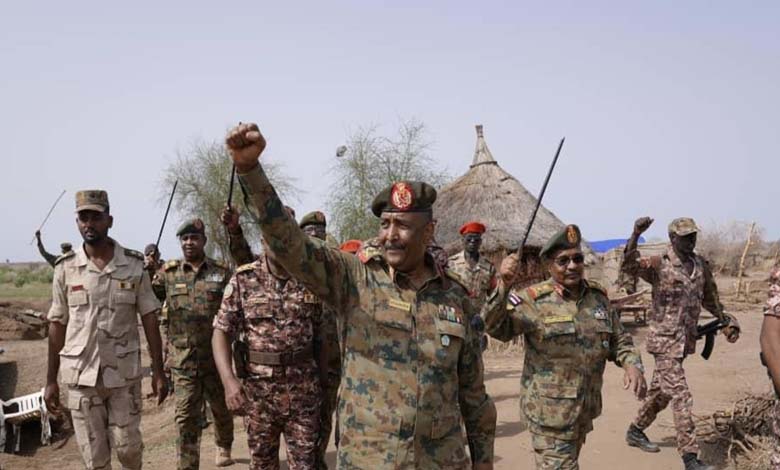Sudan Between the Hammer of the Army and the Anvil of the Islamists

Events in Sudan are unfolding at a rapid pace, revealing that the ongoing conflict is no longer merely a confrontation between the army and the Rapid Support Forces (RSF). It has become a battleground for internal power struggles within the military establishment itself, where personal ambitions intersect with old ideological alliances, turning the nation’s future into a bargaining chip among forces incapable of building a state or preserving its sovereignty.
-
A Silent Political Slap: Sudan’s Movement Restrictions Expose the Army’s Deep Crisis
-
Sudan Between Looting Generals and Warmongering Islamists
Growing evidence points to secret understandings between the RSF and a faction within the army led by Abdel Fattah al-Burhan, aimed at reaching a political settlement that would exclude the Islamist faction from the scene. This sudden shift in al-Burhan’s stance reflects his belated realization that the Islamists have become a burden rather than an ally — a liability threatening his survival. Remaining tied to them risks isolating him domestically and increasing external pressure on his leadership.
At the same time, more indications have emerged of the army’s abandonment of the armed movements in Al-Fashir, leaving them to face their fate without political or logistical support. This attitude exposes a deeply entrenched racist mindset within the military hierarchy, which continues to view groups from western Sudan as expendable tools. Such a perception reduces the nation to selective geography and reproduces the very divisions that once tore the country apart.
-
Al-Burhan and the Islamist Movement: A Troubled Alliance Selling Off Sudanese Sovereignty
-
El-Fasher: the knot that sums up the Sudanese crisis
In Port Sudan, where the self-proclaimed “legitimate” authority is based, another tragedy is unfolding. The healthcare system has completely collapsed, epidemics are spreading rapidly, and the military leadership is accused of stockpiling medicines and medical supplies for its war effort. In a country consumed by crises, medicine has become a weapon and hospitals are held hostage — a stark illustration of a regime that burdens rather than protects its people.
Amid this collapse, accusations of corruption continue to mount against senior army officials involved in smuggling and illicitly selling Sudanese gold, diverting the profits into personal accounts in collusion with foreign actors. This corruption not only exposes the moral decay of state institutions but also reveals a war economy designed to preserve privileges rather than defend the nation.
-
Sudan Between the Hammer of Its Crises and the Anvil of Turkish Influence
-
Disguised Guardianship: Sudan Between Its Internal Chaos and Ankara’s Expanding Influence
On the battlefield, the picture is even darker. The army is retreating repeatedly in Kordofan, Al-Fashir is on the brink of falling, and deep divisions persist between the army leadership and the Islamist movement over military strategy. Once a symbol of national unity, the army is now fractured, unable to unite its ranks or even define its real enemy.
Reports suggest imminent leadership changes within the army — signs of an escalating internal struggle among competing factions seeking political and military dominance. These conflicts reflect a total loss of direction within an institution that has devolved into a collection of competing interests, where loyalty shifts according to survival needs.
-
White Nile: War Kills Civilians Before Soldiers in Sudan
-
White Nile: Fire Messages Between Domestic and External Fronts in Sudan
Amid this turmoil, reports have surfaced that al-Burhan has made painful concessions to a neighboring country on the demarcation of maritime borders, granting it control over Port Sudan’s operations in exchange for continued political and military support. Such a move constitutes a blatant violation of national sovereignty and proves that the military leadership is now willing to trade the country’s territory for its own survival.
Despite al-Burhan’s attempts to distance himself from the Islamist movement, its influence within the army remains strong. Former regime figures reject any peaceful resolution, pushing instead for a military solution that will drain what remains of the nation’s resources and fuel ethnic and tribal conflicts. Driven by the illusion of restoring their lost power, they are ready to rebuild their rule upon the ruins of Sudan.
-
Between Deception and Failure: How the Sudanese Army Manufactures Illusory Victories
-
Strategic strikes shake Sudan: attack on Al-Jaili refinery and the fall of General Abu Obeida
External pressure compounds the crisis. Reports indicate that Egypt is blackmailing al-Burhan to maintain its support, pressuring him to forgo Sudan’s claims over Halayeb and Shalatin and to show troubling flexibility on the Nile water issue. This dependence highlights the fragility of Sudan’s leadership and its subjugation to foreign agendas.
Today, Sudan stands at a perilous crossroads. Between a corrupt, dependent army and an Islamist movement seeking to regain power through chaos, the state is collapsing, and citizens’ hopes are suffocating. The struggle is no longer just for power, but for the very identity and future of Sudan.
Unless a unified civilian project emerges — one that breaks with both militarism and ideology — Sudan will remain trapped between an army that has lost its honor and Islamists who only know the language of blood. Then, all that will remain of the nation will be its name, traded by warlords across negotiation maps.
-
Report: The Sudanese Army’s Media Disinformation… Manufacturing Illusory Victories to Conceal Battlefield Losses
-
The Rise of the Sudanese Army’s Disinformation Narrative: Fabricated Operations and Inflated Illusory Victories
-
Children without eyes and barren land: the chemical weapons that expose Port Sudan’s authority












